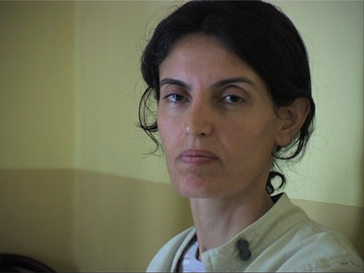
Born in 1973 in Paris (FR)
Lives in Paris (FR)

2011
Video 4/3, color, sound
Durée : 6'36''
Year of Purchase: 2011
“More than consolation is: You too have weapons.” 0
“But the body is also directly involved in a political field; power relations have an immediate hold upon it; they invest it, mark it, train it, torture it, force it to carry out tasks, to perform ceremonies, to emit signs.” 01
Humanity is a physical reality. Clarisse Hahn investigates the way in which the body itself is invested with relations of power and domination, and the way individual and collective histories, identities, and ideologies are constructed on its site as a “place of meditation and a border location.” 1 By privileging a documentary, ethnographic, somewhat Kafkaesque, approach through the use of video, the artist plays on the ambiguity of exposing the truth, where the testimony of the real is not a release, where the work is a document and the document is a work: in the name of the Other.
The two Turkish protagonists of the film, imprisoned for their political ideas, have risked their lives in a hunger strike launched in 2000 as a protest against the repression of political opposition by the Turkish State, against a government that carries out killings even in prisons. The two women are nameless faces, subjects who are closely connected with the situation and the narrative project of a film aiming at representing the “unnamable” subject-matter and elaborating a memory based on this unnamable. The only right that remains is the right to exist. The hunger strike thus becomes a prophetic voice of the dispossessed, an act of resistance to the non-violent destruction of the other. The strikers display their vulnerable bodies as a symbol of their position of powerlessness, a transgression against life itself in order to appeal to the collective imagination. A male voiceover plays the part of the narrator, interpreter, mediator, and moralist. The voice expands the context in which the images are inscribed: rather than a threat of death “in vain,” their struggle becomes a fight for life, the hope of a strategy of despair.
Against the intolerable institutional “white death,” these women vowed to surrender to death so that justice would be granted to others. They responded by sacrifice, the ultimate cry of the body which appeals to humanity and compassion of the public opinion and the authorities.
A punishment is normally meant as a corrective measure, as a “cure.” The women have survived their “fast to death” but have suffered irreparable damage as a price for their struggle for Democracy: they have developed psychosomatic, mental, and emotional disorders. The face of the woman who begins to testify to her honor, emaciated and twitching uncontrollably, in turn testifies to the torment of a 130-day-long strike. The other woman, who at first glance appears unaffected, underneath her pride betrays disconcerting nostalgia: “With each instant I was closer to death, and that made me happy. I was like a gun ready to fire. I was a bullet ready to discharge. My body is a weapon. A weapon that is firing for victory.”
The recording of this double portrait is devoid of any cinematographic temptation; it is simple and clear, expressive and modest. The human figure is an event every time. It reveals a fragment of the world and a moment in history. Two faces, their backs to the wall, and words which offer a glimpse into the violence. The camera moves from one to the other. The bodies themselves, which one imagines marked by hunger, are never shown. The two women are not posing. Their determination can be easily read in their faces, their necks straight like soldiers’, made sacred by the image of the survivors. All we’ll ever know of them is this struggle. They are there, alive, no more no less, body and soul of resistance.
Luc Jeand’heur
0 Franz Kafka, Diaries, 12 juin 1923
01 Michel Foucault, Discipline and Punish: The Birth of the Prison. Trans. Alan Sheridan (Vintage 1977; orig. 1975). p. 25.
1 Clarisse Hahn